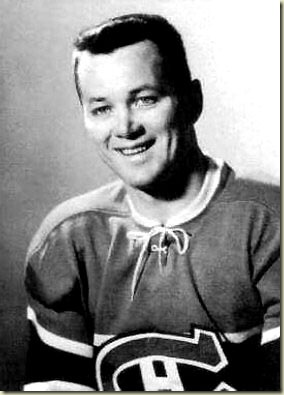 I remember sitting at home, on Boxing Day 1989, when I heard the news that Canadiens legend Doug Harvey had passed away at the age of 65.
I remember sitting at home, on Boxing Day 1989, when I heard the news that Canadiens legend Doug Harvey had passed away at the age of 65.
Harvey had retired from playing almost a year before I was even born, but I was well aware of the Hall of Fame blue liner, and what he brought to the game.
While many legends, that I grew up watching, relied on speed and physical play, Harvey’s ability to control the tempo of the play is what set him apart from the rest to this day.
Many still debate who was the better defenseman, Orr or Harvey.
Harvey would slow the pace of the game down, looking up ice to see who was on the ice and where they were going.
HIs style of play actually frustrated not only the opposition, but also his teammates, and coach Dick Irvin, when he first began playing for the Canadiens in 1947.
Soon they realized the benefits of his tactics. Harvey knew that he wasn’t necessarily the fastest player on the ice, but that a moving puck could get up ice faster than most skaters.
Combined with his defense, vision and stick-handling abilities, Harvey made it a habit of drawing in forecheckers, then setting up and odd-man rush with a quick up-ice pass.
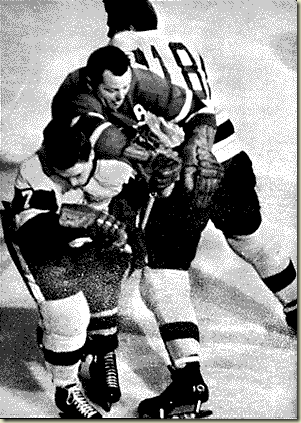 "I'm not throwing any pucks away," he said. "I'm trying to do what's best for the team. That's why I take my time and make the play."
"I'm not throwing any pucks away," he said. "I'm trying to do what's best for the team. That's why I take my time and make the play."
Though not a hard-hitting defender, he did play a very physical game and a tremendous ability to free the puck from opposing attackers.
With his forwards able to play up ice in a transition game, and rely on Harvey, Emile Bouchard, and later Tom Johnson holding court on the blue line, fire wagon hockey was born.
Harvey’s play would help the Canadiens win the Stanley Cup in 1952-53.
It was interesting to note that after Elmer Lach’s overtime winner, in game five, Harvey did not stay on the ice to shake hands with the Boston Bruins.
"I'm running them into the boards and banging them around one minute and because we win the Stanley Cup, that's going to change? I don't really like them anyway. Why should I shake their hands?"
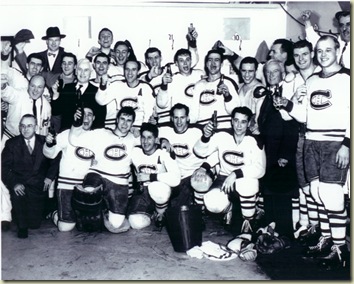 The following season, the Canadiens were back in the finals, where Harvey was the victim of his own-goal in the game seven overtime against Detroit.
The following season, the Canadiens were back in the finals, where Harvey was the victim of his own-goal in the game seven overtime against Detroit.
He didn’t let the error affect him though, as the following season he won the first of seven Norris Trophies as the NHL’s top defenceman.
“When I joined Montreal,” said Jean Beliveau, “He was the best defenceman I’d ever seen.”
As the Canadiens began their dynasty of five straight Stanley Cups, Harvey was the quarterback of one of the most dominating power play units in NHL history.
It was so effective that the NHL had to change the rules, in 1956, to allow a penalized player to return to the ice once the team with the man-advantage had scored.
Harvey had run of four Norris Trophy’s from 1955 to 1958. His defensive partner, Tom Johnson, would win it in 1959 before Harvey reclaimed it yet again the following season.
With the retirement of Maurice Richard after the 1959-60 season, Harvey was named captain of the Canadiens.
It would be a short tenure however. Despite being known as a good team leader on the ice and in the room (many felt he should have been named captain over the popular Richard), his relationship with management began to diminish.
Along with other players, Harvey had been attempting to form a players association when they learned that the owners were not matching the players pension contributions.
The attempt went without success and Harvey was essentially blacklisted, as he put it, by the league.
The rift between Harvey and Canadiens GM Frank Selke was further escalated by his alcoholism and bi-polar disorder.
Harvey was notorious for being the last player to get on the bus or on the train, according to assistant GM and former defenseman Ken Reardon.
He also appeared at a formal event in a Tuxedo and running shoes and once skipped a team dinner to go drinking.
“I’m my own man,” Harvey said. “This is who I am.”
Reardon and Selke felt otherwise and something had to be done.
“As a front office man, you don’t want him as captain,” Reardon said.
At the end of the 1960-61 season, after winning his sixth Norris and ninth First Team All Star selection, he was traded to the New York Rangers.
"It had to do with union activities," Harvey said on the trade. "I was a First Team All-Star and won the Norris that year. You don't give away a player like that!"
He has a valued point as Ted Lindsay, another involved in the players association attempt, was traded to the Chicago Blackhawks three years earlier.
“I would have been traded earlier,” Harvey once said. “But we kept winning all those Cups. Selke knew if he traded me then, the fans would riot.”
Harvey fought to stay in Montreal but realizing that he had no choice in the matter, reported to the Rangers.
As the last player-coach in NHL history, he won his final Norris trophy and First-team All-Star awards while leading the Rangers to their first playoff birth in three seasons.
He stepped down as coach to focus on playing with the Rangers for two more seasons.
“I liked playing best,” he said. “Being with the boys, having fun and tossing back a few after the game. I never really liked coaching that much.”
Left unprotected by the Rangers in the 1963 intra-league draft, he signed as a free agent with the AHL Quebec Aces. Harvey would play for Quebec, Baltimore and Pittsburgh over three seasons before resurfacing in the NHL, for two games in 1966-67, with Detroit.
With the NHL expanding to a dozen teams, Harvey became player-coach of the St. Louis Blues’ AHL affiliate in Kansas City.
He would be called up by the Blues in their playoff run during the 1967-68 season, and played all 70 games for the Blues in the following year.
At age 44, he retired from playing.
Harvey stayed in hockey as an assistant manager for the WHA’s Houston Aeros. He is credited with convincing the Aeros to sign two underge brothers, Mark and Marty Howe, to pro contracts.
Once they were signed, their legendary father, Gordie Howe, came out of retirement to play with his sons.
The question of being black listed comes into play once again in 1972. With his credentials, Harvey should have been elected into the Hockey Hall of Fame that year, but he wasn’t.
It was the same year that Howe and Jean Beliveau were exempted from the three-year waiting period.
“They don’t want me in there because I’ve been known to hoist a few,” Harvey said never afraid to speak his mind. “And they’ve never forgiven Ted Lindsay and I for helping for the NHLPA. We were blackballed when we did that.”
For the record, Ted Lindsay was inducted into the Hall of Fame in 1966 and also was exempt from the three-year wait.
On July 5, 1973, the Hockey Hall of Fame sent a letter out to Harvey congratulating him upon his election to the Hockey Hall of Fame.
Fifteen days later, Harvey’s wife Ursula replied to inform the Hall of Fame that Harvey had refused to accept his election, despite talking to him over the phone the night before in hopes of changing his mind.
Instead of spending the day when a player has achieved a pinnacle of personal success, Harvey spent the day fishing and drinking.
During retirement, Harvey went into a nomadic lifestyle, travelling across the country.
Many believe he was homeless and living in a boxcar. Truth of the matter was, it was a mobile, and rather elaborate, unit once owned by John Diefenbaker for visiting dignitaries. Harvey’s home-base was set up on a raceway, just outside of Ottawa.
One of hockey’s greatest players had virtually vanished into obscurity.
In 1984, Harvey had stopped drinking. At the same time, on their 75th anniversary, fans of the Montreal Canadiens selected an all-time All-Star Team.
 Jacques Plante was chosen as goaltender, the forwards were Jean Beliveau, Dickie Moore and Maurice Richard while the blueliners selected were Larry Robinson and Doug Harvey.
Jacques Plante was chosen as goaltender, the forwards were Jean Beliveau, Dickie Moore and Maurice Richard while the blueliners selected were Larry Robinson and Doug Harvey.
The group, along with all-time coach Toe Blake and Aurele Joliat made a memorable appearance in uniform before the Forum crowd.
On October 26, 1985, his No. 2 was retired by the Canadiens and he was hired on as a part-time scout.
Harvey was diagnosed with cirrhosis of the liver in 1988 and died a week after his 65th birthday in Montreal General Hospital in 1989.
“I feel very,” said Maurice Richard on his passing. “We had a lot of fun together. Doug was great, always willing to help.”
"If I had to do it over again," Harvey said shortly before his death. "I wouldn't have changed a thing."
He truly was his own man.
Did you know?:
Doug Harvey began playing hockey as a goalie, but was moved to forward.
He was a multi sport athlete in high school and played hockey for the school throughout his years at the school, although somehow was excluded from the 1941 Senior team.
In 1942 he was moved from centre to defence by coach Jack Black, and in 1943 his school won the city championship.
He was touted by the Boston Braves to play baseball, and also had a chance to play pro football, before signing on with the Royal Canadian Navy, where he won the Navy boxing title.
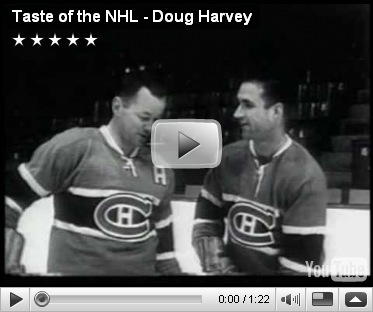
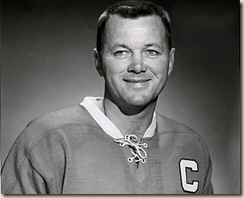
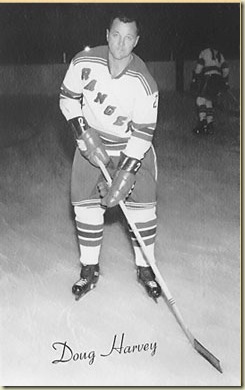
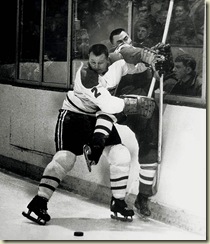
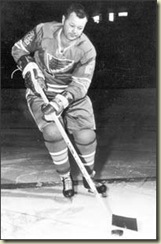
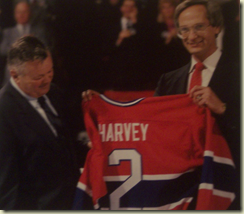
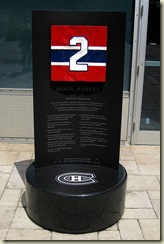







No comments:
Post a Comment